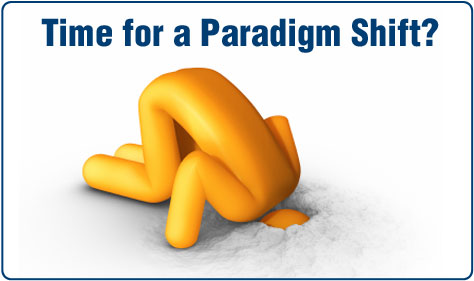A letter just published in JAMA Psychiatry suggests that “precision psychiatry” is not the paradigm shift it’s purported to be by the psychiatric establishment.
The paper was authored by Ana Gómez-Carrillo, MD, Dr Med; Timothé Langlois-Thérien, BSc, and Laurence J. Kirmayer, MD, FRCPC, FCAHS, FRSC, at McGill University and at Jewish General Hospital in Montreal, Québec.
A previous “viewpoint” featured in JAMA Psychiatry suggested the need for a “paradigm shift” in psychiatry—but focused on “genomic medicine” as if it were that shift. “Genomic medicine” forms the basis of what is called “precision psychiatry.” It’s based on the notion that if enough genetic variants are discovered, pharmaceuticals could be targeted to specific people with those variants—thus, supposedly targeting only those who would have a positive reaction to those chemicals.
However, as Gómez-Carrillo and the other authors point out in their letter, this is hardly a paradigm shift. After all, mainstream psychiatry already operates on the assumption that mental health concerns are a brain disorder which can be targeted via pharmaceutical agents. This supposed “paradigm shift” is simply saying “psychiatrists need to better target those pharmaceuticals”—which is, at best, a slight extension of the current paradigm, not a shift.
According to Gómez-Carrillo, “The authors’ view perpetuates current reductive explanatory approaches and, as such, cannot be considered a paradigm shift.”
 Although neurobiological psychiatry has identified numerous genetic variants that are theoretically associated with mental health concerns, none of these variants are useful for telling the difference between individuals with and without mental health concerns (aside from physical illness markers such as those for thyroid disease or metabolic illness, which can lead to mental health problems).
Although neurobiological psychiatry has identified numerous genetic variants that are theoretically associated with mental health concerns, none of these variants are useful for telling the difference between individuals with and without mental health concerns (aside from physical illness markers such as those for thyroid disease or metabolic illness, which can lead to mental health problems).
For instance, one study, reported on here at Mad in America found that, out of 7,849 people with a mental health diagnosis, 32 people had a particular genetic variant. Out of the 10,799 people in the “healthy” control group, 9 had that same genetic variant. That is, in both groups, a minuscule number of people had that genetic variant, and more than 99.5% of people in both groups did not have that genetic variant. Nonetheless, this study was presented as if it was scientific evidence that a genetic variant was discovered that was linked with mental health concerns.
Thus, Gómez-Carrillo argues that “precision psychiatry” as it is presented in the literature is a red herring, continuing the dominance of the neurobiological reductionist paradigm that has repeatedly failed to find any identifiable biomarkers for mental health concerns.
Instead, writes Gómez-Carrillo, psychiatry should be focusing on better understanding the social, environmental, and psychological correlates of mental health concerns. After all, trauma, poverty, marginalized identity, and urban living are all much more highly correlated with mental health concerns than biological factors. That, she writes, would be a true paradigm shift.
****
Gómez-Carrillo, A., Langlois-Thérien, T., Kirmayer, L. J. (2018). Precision psychiatry—Yes, but precisely what? JAMA Psychiatry, e1. Published online October 17, 2018. doi:10.1001/jamapsychiatry.2018.2651 (Link)















Sounds a bit like a blind alley but if they can screen people and do an RCT the world could be their oyster. But it sounds pretty improbable.
Pschiatrists really do believe that “the right drug suits the right person” when it looks more like some people are just big placebo responders or perhaps should not have been in the study at all. There is no evidence for the subgroup hypothesis, because if there were, you could test that subgroup.
Report comment
And if there were, the “subgroup” would be the actual diagnostic category, and they’d admit there was nothing wrong with the rest of the group. Also, the “subgroup” would have to have something more in common than “reacting positively” to a drug. Lots of people “respond positively” to alcohol when anxious, but we don’t categorize them as “mentally ill.” They just like how it feels when they drink alcohol.
Report comment
It is a blind alley, but these “authorities” have to take it in their search for the alleged miracle drug that is not only the Magic Treatment for the supposed discovery, but also the Magic Creator of Fame and Fortune for themselves.
Report comment
“We now call the destruction of old ideas, politely, a “paradigm shift.” “Catastrophe theory” would be more appropriate. The vitality of a culture depends less on its hopes and its history than on its capacity to entertain willingly the divine and daimonic force of ideas.”
James Hillman – the only one defender of the psyche, and the only one phenomenologist. If you won’t understand what psyche is, you won’t defend anyone. The phenomenology is needed, and false empiricism must die. Psychological awarness means a new system. Without acceptance of mythical reality we can not defend psyche.
“Re – visioning psychology”.
Report comment
So-called precision psychiatry, and there is nothing precision about it, is not a paradigm shift.
I don’t see it as a “blind alley” though, not unless it is “consumer/users” and the general public that are being blinded. If they test people’s responses to drugs, you’ve got a method of making more people compliant, and thus, duping and doping more people. The problem, obviously, is that this also means more drug induced injury, ‘disability’, and death.
If you’re looking for the precision part of it, maybe it is really precision social control that they are after. Polish our deceptions, and we’ve got more people following us like lemmings.
1. It’s not a paradigm change.
2. If the problem is not “bad genes”. Assuming that the problem were “bad genes” is a false basis to work under (i.e. an error).
3. Even if “mental disorder” were, as I heard somebody say once, 70 % genetic, that would leave 30 % to social, psychological, or other causes, and I imagine there is no basis for the 70 % figure anyway except that it would make the “disorder” more biological than not. In other words, the figure is entirely arbitrary, and only given because it supports the theory.
4. The research on genes, as you’ve shown above, doesn’t support the theory. If genes have little to do with the development of “mental disorder” then they have much less to do with the development of “mental disorder” than many people presently presume.
Report comment
“Precision psychiatry” is a term I’d never heard but immediately intuited must be the psychiatric version of a “smart bomb” — which apparently is what it is meant to be.
“Neurobiological psychiatry,” huh? A new sub-specialty of psychiatric fraud.
Report comment
Pharmacogenetics is not fraud oldhead…. used correctly in a court of law it will establish the terrible harm was caused by GP’s and psychiatrists (coerced/forced) and remove them from their defense of the victim being ‘mentally ill’.
Report comment
Anything employing the term “psychiatry” is fraud. “Neurology” would do just fine.
Report comment
How this short article manages to -get it- and -forget it- is a large part of the reason we are stuck in the endless recycling of the same “mental illness’ myths.
Saying that… thyroid disease or metabolic illness… can lead to mental health problems… is absolute bunk.
Thyroid and 100+ other bona fide diseases (provable underlying, root cause conditions) are called ‘medical mimics” or as Kelly Brogan recently referred to them as “psychiatric pretenders”, because the normal sequalea or SYMPTOMS of which, are often MISDIAGNOSED as if they were a bogus “MI”.
This is evidenced by the fact that once a person is properly treated for their thyroid, their symptoms resolve, just like they do when a person has a vitamin deficiency and those deficiencies are addressed with vitamins.
This misinformation is a perfect example of why we have a false epidemic of “MI”.
The standard of practice is to prepare a list of
“differential diagnosis’s”, test for those REAL conditions (such as thyroid which is prevalent) and rule them in or out BEFORE labeling someone with a specious brain disease.
This misguided statement will not and cannot help anyone and it is harmful. There is no such thing as “MI” and this professional misstatement sets up the millions of people with Thyroid and other autoimmune and rare diseases, to be psychiatrized and harmed by more medical malpractice. These are real people. Stop it.
Report comment